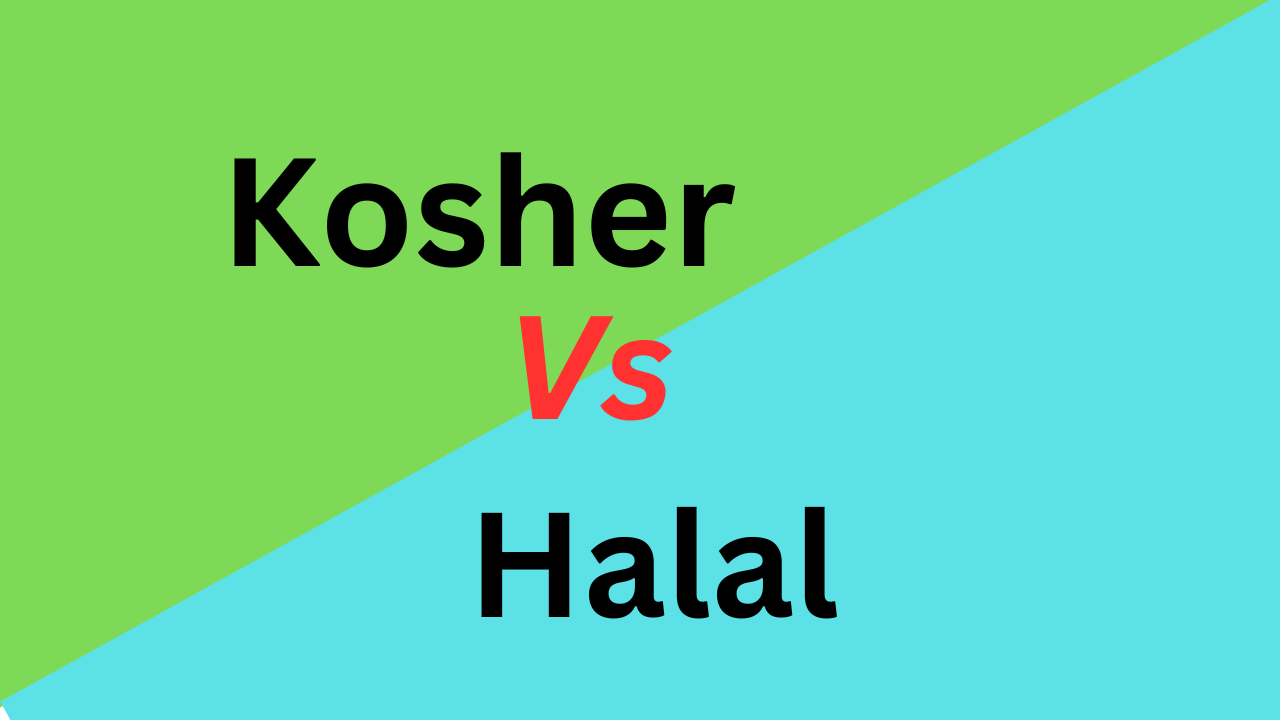What is the main difference between Kosher and Halal? The former refers to foods that conform with kashrut regulations or Jewish dietary law, while the latter refers to foods and drinks permissible to Islamic laws.
Kosher and Halal diets have similar eating patterns based on the Jewish and Islamic principles respectively. You can also differentiate Halal from Kosher by stating that Halal requires the praying to Allah before slaughtering and Kosher does not.
Can meat be both Kosher and Halal? This is one of the question that still puzzle many people who follow Jewish and Islamic religion. We wrote this blog post to help you understand the difference between Halal and Kosher in details.

Difference Between Kosher and Halal With Table
| Basic Terms | Halal | Kosher |
| Meaning | Refers to foods that conform to Islamic dietary law. | Refers to foods that conforms to Jewish dietary law. |
| Guidelines | Follows Islamic dietary law | Follows Jewish dietary law |
| Origin of the Word | Arabic word which means permissible or lawful. | Hebrew word which means proper or fit |
| Found in Holy Book | Quran | Torah |
| Butcher of Animal | Must be a Muslim | Must be a Jew |
| Prayer Requirement | Prayer to Allah is must before slaughtering | Prayer not necessary when slaughtering |
| Fruits and Vegetables | Halal | Kosher if they do not have bugs |
| Meat and Diary | Consumed together | Not consumed together |
| Alcohol Consumption | Not allowed | Allowed with moderation |
| Animal Type for Meat | Herbivorous land animals (except for domestic donkeys), birds (except for crows and birds of prey), certain insects, and all kinds of seafood are permitted. | Mammals that have split hooves and chew their cud. |
What Is Kosher?
Kosher refers to a set of dietary guidelines and food preparation practices in Jewish tradition. Foods considered kosher adhere to strict rules outlined in religious texts, such as the Torah.
Key requirements include the separation of meat and dairy products, strict supervision of slaughtering animals, and the prohibition of certain foods like pork and shellfish.
Kosher-certified foods must be prepared and processed under specific conditions to maintain their kosher status. These dietary laws reflect religious principles of purity, sanctity, and ethical treatment of animals.
What Is Halal?
Halal is a term used in Islamic dietary guidelines and practices. It refers to food, drinks, and other products that are permissible and lawful for Muslims to consume or use.
Halal foods must meet specific religious requirements as outlined in the Quran. Key principles include the prohibition of pork and its by-products, the humane and ritualistic slaughter of animals, and the avoidance of intoxicating substances.
Foods should not come into contact with non-halal items during processing or preparation. Observing halal practices is an important aspect of Islamic culture and plays a significant role in the lives of millions of Muslims globally.
Subscribe To My Channel
Main Difference Between Kosher and Halal
- Kosher dietary laws are derived from the Torah and related rabbinic teachings while Halal dietary laws are based on Islamic religious teachings found in the Quran and Hadith.
- In kosher, animals must be slaughtered by a trained Jewish person, while in halal, the slaughter is performed by a Muslim person.
- Pork and its by-products, shellfish, and certain insects are prohibited by Kosher, while Pork and its by-products, alcohol, and birds of prey are not Halal.
- Products that adhere to kosher standards may bear a kosher certification symbol, while Halal products may display a halal certification mark.
- Prayers are not an essential requirement when slaughtering for meat to be considered kosher, while prayers are compulsory when slaughtering for meat to be halal.
Similarities Between Kosher and Halal
- Both kosher and halal provide dietary guidelines and restrictions for followers of their respective religions.
- Both kosher and halal dietary laws strictly forbid the consumption of pork and its by-products.
- Both require animals to be slaughtered following specific ritualistic methods to ensure humane treatment.
- Both kosher and halal dietary laws prohibit the consumption of alcoholic beverages.
- Both have certification processes where products meeting the respective dietary requirements can be labeled as kosher or halal.
- Both dietary practices hold significant cultural and religious importance within their respective communities.
- Both kosher and halal products are found in various countries.
Final Thoughts from Experts
The main difference between Kosher and Halal is based on the strict guidelines regarding which foods are permitted in accordance to Jewish and Islamic Law. Both diets also have specific rules regarding slaughtering animals for meat.
So, Halal refers to foods accepted by Muslims and Kosher refers to foods accepted by Jew. If you have been puzzled by these phrases, I hope this article provided all the answers. Feel free to share with your friends and family.
People Who Read This Also Read:
- Difference Between Jews and Christians
- Difference Between Islam and Christianity
- Difference Between Judaism and Christianity
- Difference Between Catholic and Protestant Church
- Difference Between Baptism and Christening